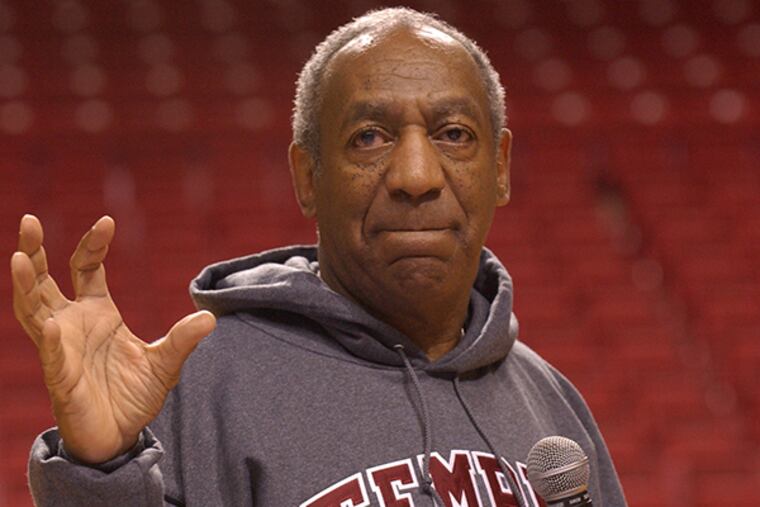Bill Cosby's latest gift to Temple: his resignation
Whatever they did, it seems Temple University's board of trustees couldn't win. Their most famous and loyal member, Bill Cosby, was the subject of an escalating string of ugly accusations of decades-old sexual assaults.

Whatever they did, it seems Temple University's board of trustees couldn't win.
Their most famous and loyal member, Bill Cosby, was the subject of an escalating string of ugly accusations of decades-old sexual assaults.
Many of the board members are lawyers or judges, upholders of a system where one is presumed innocent until proved otherwise. And Cosby has never been found guilty of any sexual impropriety.
So board members took their time, weighing what to do. While that annoyed some people, others expected nothing less.
"It's not shocking that a university board would hesitate before taking a very, very serious action like asking somebody to leave the board," said Bruce Ledewitz, a professor of law at Duquesne Law School, a step that he said could amount to "a conviction in the view of the public."
In the end, as the accusations mounted - 20 women have spoken up - Cosby took the matter out of the board's hands. Trustees were in discussions about Cosby's status when the actor and comedian offered to resign, according to board chair Patrick O'Connor.
"It was painful," O'Connor said, reflecting on the call he took from Cosby on Monday. "He did so much for the university and the students and cared so much about the school."
O'Connor defended the trustees' handling of the matter, despite criticism from some corners that the university should have moved more swiftly to cut ties with its alumnus and benefactor.
"We were going to deal with the issue at the appropriate time when we had all the facts," O'Connor said. "That's what boards should do."
Cosby was concerned about the impact of the allegations on Temple and wanted to do what was best for the university, O'Connor said.
Attempts to reach Cosby - who has denied the allegations - were not successful.
It was nearly a decade ago that Cosby faced sexual-assault allegations from more than a dozen women as part of a civil suit, since settled, filed in Montgomery County. At the time, O'Connor represented his fellow trustee in the matter lodged by former Temple employee Andrea Constand.
But now, some of the same allegations have cost the actor more than a seat on Temple's board.
It all started with comedian Hannibal Buress' remark at an October performance in Philadelphia. Cosby rapes women, he said from the stage. The video, captured by a Philadelphia Magazine writer, went viral. And one by one, women came forward and put their names to the accusations.
The old stories, dating to the 1960s, landed against a new backdrop on the nation's college and university campuses in which women increasingly are speaking out about sexual assault and their colleges' failure to appropriately address the problem. Temple is one of more than 80 institutions around the country under federal investigation for its handling of sexual-assault complaints.
A native of Philadelphia, Cosby attended Temple in the early 1960s on a track and field scholarship. He studied physical education and also played football before leaving to pursue a comedy career. He returned to Temple to earn his bachelor's degree in 1971, according to a university spokesman.
It's unclear what relationship the 77-year-old entertainer will have with Temple in the future. Multiple sources have said he would not speak at commencement, a task he performed as a trustee.
The Camille and Bill Cosby Scholarship in Science - a $3,000 award to a rising junior majoring in natural sciences - is expected to continue, a university spokesman said.
Though on the board since 1982, Cosby rarely attended trustee meetings. Minutes dating to his arrival show he was there only once, in December 2002.
But Temple officials said Cosby had impact in other ways.
"He was very loyal to Temple University for a very long time," university president Neil D. Theobald said.
Former Temple president David Adamany, now a professor of law and political science, said he took a call from Cosby just about every other Friday.
"Always the discussion was about the quality of education here," said Adamany, president from 2000 to 2006.
He recalled conversations with Cosby about the amount of writing students had as part of the required curriculum, and about grading standards and class sizes: "These conversations would go on for 30 or 45 minutes."
Arthur Hochner, president of the faculty union, said Cosby's departure was a great loss for the school but necessary - whether the allegations are true or not.
"If he hadn't resigned, the story would continue and it wouldn't be good for Temple," said Hochner, a business school professor.
Hochner said he was not sure what to believe about the allegations that Cosby over the span of decades drugged and sexually assaulted women.
"Where there is smoke, there's often fire. Not always, but there's an awful lot of smoke, though," he said. "There are just too many of these allegations not to take the whole thing very seriously."
The university's leadership still hasn't adequately addressed Cosby's departure, Hochner said, other than to accept his resignation and thank him for his service.
"I think they owe it to the public to say something and to show that they take this seriously," he said.
Though Constand's civil suit was settled, it doesn't connote guilt, said Ledewitz, the Duquesne law professor. Sometimes people settle to avoid an expensive, time-consuming court process, he said, because "even if you win, you lose."
Anthony J. McIntyre, a Temple board member and entrepreneur, said the board wasn't going to act based on public pressure.
"I think the university took a prudent amount of time," he said.
215-854-4693 @ssnyderinq